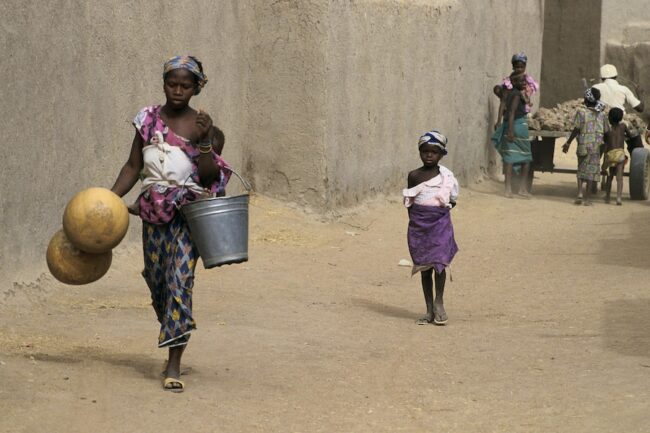MMM calls for redefinition of ‘work’ to encompass both paid & unpaid work
28.09.22
UN Geneva, Human Rights Council - MMM took the opportunity of a panel discussion on the future of the right to work in the context of Climate Change, to call for a more holistic view of 'work', where both paid and unpaid care work are considered and their interrelation recognized. In the context of Climate Change, which often increases mothers' unpaid care workload, we also called for a reassessment of what the Right to Work means in relation to a Right to Care.

The following is the oral statement delivered by MMM main representative to the UN Geneva, Valerie Bichelmeier.
Raising and educating a child, caring for an older person or a dependent relative, running a household – this IS all work, although mostly unpaid.
Yet, this indispensable work is not what we are talking about when discussing the right to work.
The unpaid work of caring for each other is only framed as a burden, an obstacle to the realisation of women’s right to (paid) work and economic empowerment.
The Covid-19 and Climate Change crises have both increased the unpaid domestic and care workload of women, mothers in particular, further threatening their right to paid work and exacerbating gender inequalities.
At the same time, these crises have also shed light on how essential and foundational this work is for the wellbeing of all, and for the functioning and future of our society and economy.
We at MMM are therefore calling for a redefinition of ‘work’ as a holistic concept, where both paid and unpaid work are combined and intertwined. The right to work and its relation to a right to care needs be reassessed and clarified.
We also call on states to:
- Acknowledge that the multiple crises we face today (Covid-19 and climate change, but also environmental degradation, rising inequalities…) are all deeply rooted in an economic system that fails to recognize, value, protect, and invest in what’s essential to our wellbeing – Care and support for caregivers
- Seize the opportunity of these multiple crises to transform our economic systems at every level: it is time to move beyond the ‘GDP growth’ narratives and short-term profit making, and repurpose our economy to a caring economy, one that is human-centred and serves the wellbeing of both people and our planet
This oral statement was delivered during the Panel on the The future of the right to work in connection with climate change actions, responses and impacts in the context of sustainable and inclusive economies, which took place on 27 September 2022 as part of the 51st Session of the Human Rights Council.
The New EU Gender Equality Roadmap : A Call for Inclusion of Mothers
04.03.25
The European Commission’s initiative on a new Gender Equality Roadmap post-2025, marks a significant step forward in addressing gender disparities across the European Union. Make Mothers Matter (MMM
Breaking the Cycle: Gender Equality as a Path to Better Mental Health
18.03.25
The Council of the European Union has taken a decisive step in recognising the vital connection between gender equality and mental health.
Europe Must Listen to Mothers: Our landmark report heads to the European Parliament
28.08.25
On 22 September 2025, the voices of mothers will take centre stage in Brussels. For the first time, Make Mothers Matter (MMM) will present its State of Motherhood in Europe








